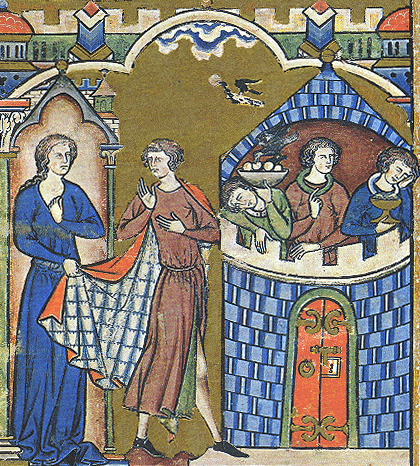Adams on Psalm 109:10-13, 16
10-13 Many penurious fathers are so scraping for their children, that they ravish the poor children of God; but the hand of the Lord shall be against their young lions. Na 2:13. They join house to house and field to field but their children shall be "vagabonds and beg", "seeking their bread out of their desolate places." How many a covetous mole is now digging a house in the earth for his posterity, and never dreams of this sequel, that God should make those children beggars, for whose sake their fathers had made so many beggars! This is a quittance which the sire will not believe, but as sure as God is just the son shall feel. Now if he had but leave to come out of hell for an hour, and see this, how should he curse his folly! Sure, if possible, it would double the pain of his infernal torture. Be moderate, then, ye that so insatiately devour, as if you had an infinite capacity: you overload your stomachs, it is fit they should be disburdened in shameful spewing. How quickly doth a worldly minded man grow a defrauder, from a defrauder to a usurer, from a usurer to an oppressor, from an oppressor to an extortioner! If his eyes do but tell his heart of a booty, his heart will charge his hand, and he must have it, Mic 2:2. They do but see it, like it, and take it. Observe their due payment. Let the extortioner catch all that he hath: they got all by extortion, they shall lose all by extortion. They spoiled their neighbours, strangers shall spoil them. How often hath the poor widow and orphan cried, wept, groaned to them for mercy, and found none! They have taught God how to deal with themselves; let there be none to extend mercy to them. They have advanced houses for a memorial, and dedicated lands to their own names, Ps 49:11; all to get them a name; and even in this they shall be crossed: In the next generation their name shall be quite put out.
16 But persecuted the poor If any man will practice subtraction against the poor, God will use it against him, and take his name out of the book of life. If he be damned that gives not his own, what shall become of him that takes away another man's? (Augustine) If judgment without mercy shall be to him that shows no mercy (Jas 2:13) where shall subtraction and rapine appear?
Let the extortioner catch all that he hath; and let strangers spoil his labour, Ps 109:11: there is one subtraction, his estate.
Let his posterity be cut off; and in the generation following let their name be blotted out, Ps 109:13: there is another subtraction, his memory.
Let there be none to extend mercy unto him: neither let there be any to favour his fatherless children, Ps 109:12: there is another subtraction, a denial of all pity to him and his.
Let him be condemned: and let his prayer become sin, Ps 109:7: there is another subtraction, no audience from heaven.
Let another take his office; there is a subtraction of his place: let his days be few, Ps 109:8: there is a subtraction of his life.
Let him be blotted out of the book of the living, and not be written with the righteous, Ps 69:28; there is the last, the subtraction of his soul.
This is a fearful arithmetic: if the wicked add sins, God will add plagues. If they subtract from others their rights, God shall subtract from them his mercies.
As quoted in Spurgeon's Treasury of David.









